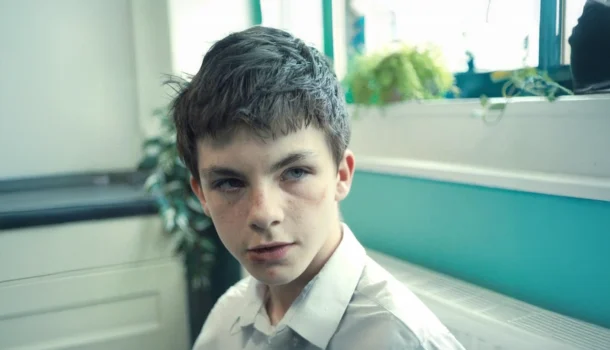Yorkshire wakes up as it has many times before: with light mist on the windows and a routine that still believes in the predictability of mornings. But it is precisely within this deceptive calm that the miniseries “Adolescence” drives its sharpest blade. In just a few minutes, a police vehicle interrupts the normalcy — an officer laughs at a voice message from his son and then joins an armed raid on a thirteen-year-old boy’s home. This initial paradox — paternal tenderness and institutional brutality — sets the tone for the series’ ongoing tension: the collapse of bonds, the failure of protective structures, and the fragility of any certainty about what it means to be a parent, a child, or a citizen. This is not a crime thriller; it is a slow and irreversible erosion of family intimacy, captured by a camera that refuses to blink.
Filmed in long takes with almost claustrophobic precision, the narrative abandons traditional investigative logic to submerge itself in the emotional wreckage caused by a crime whose contours remain deliberately vague. What matters isn’t the verdict, but the reaction to suspicion: parents who no longer recognize the child they raised, a school that functions as an incubator of complicit silences, and judicial institutions more focused on saving face than unraveling complexities. In a country proud of its meticulous legal system, viewers witness the helplessness of disoriented adults faced with teenagers whose moral compasses have been corrupted by invisible codes, anarchic social networks, and echoes of increasingly normalized misogynistic discourse.
Jamie Miller is not a mystery to be solved, but a cracked mirror that refuses singular interpretations. The script, by avoiding didacticism, allows the character to shift between emotional neglect and potential brutality, between affective fragility and the lure of toxic ideologies that offer relevance to those who feel invisible. The series dares to show that violence does not spring from nowhere, nor does it obey a singular logic: it forms in the solitude of dark rooms, in the gaps unnoticed by loving but distracted parents, in the absence of emotional references that are not algorithmic. Jamie is intelligent but doesn’t understand his pain; he is needy but repels anyone who tries to reach him. His instability, captured in pitiless close-ups, is also the portrait of an adolescence tamed by insecurity and trained to respond with fury to the slightest gesture of rejection.
By refusing to follow the judicial process and deliberately sidelining the victim’s figure, “Adolescence” concentrates its power on what usually remains at the edges: the anticipatory grief of the suspect’s family, the daily shame infiltrating the most banal gestures, family ties exposed to public decay. When Eddie, the father — played with devastating precision by Stephen Graham — has his van vandalized or avoids the gaze of the shopkeeper who recognizes his surname, it’s not just a record of prejudice. It’s a visceral staging of how crime seeps into civil relations, contaminating even the most trivial language. The pain doesn’t stem only from the accusation, but from the impossibility of continuing life as before, even if the trial hasn’t yet begun. It’s the weight of “maybe,” of “what if,” that corrodes bonds and silences affections.
In one of the miniseries’ most impactful moments, Detective Bascombe — himself a father unable to connect with his son — must hear from the boy what no policing algorithm can provide: an emotional translation of the digital codes that may have preceded the crime. This clash between authority and vulnerability encapsulates the dilemma running through the entire series: there’s no way to punish without understanding, but understanding requires descending into the slippery terrain of ambivalence, where victims and perpetrators sometimes blur. This is where the series resists any attempt at narrative comfort. The emotional impact doesn’t arise from revelations, but from exposure to complexity: adults lost in their own regrets, young people distorted by a world that demands constant performance and denies space for hesitation.
In the end, “Adolescence” seeks neither answers nor redemption. Its power lies in exposing the silent collapse of the emotional and social structures we pretend are solid. What remains is a succession of exhausted faces, dialogues that cut like glass, and a persistent sense that what was broken cannot be repaired — not by courts, not by therapists, perhaps not even by time. In an era that insists on simple answers to complex dilemmas, the series offers the opposite: a discomforting, honest, and necessary journey through the shadow zone between love and disappointment, between guilt and ignorance, between lost childhood and the responsibility no one wants to bear. Its impact doesn’t lie in convincing us of something, but in making us ask, with a tight stomach: how well do we really know who we’ve raised? And what do we do when the answer doesn’t console, but condemns?
Series: Adolescence
Creator: Stephen Graham and Jack Thorne
Director: Philip Barantini
Year: 2025
Genres: Drama/Crime
Rating: 9/10

